
Professor - Current Research Interests: Regulation and function of cyclic nucleotide phosphodiesterases. Cyclic nucelotides regulate many signaling pathways in tissues throughout the body. Our research group studies phosphodiesterases (PDEs), the enzymes that break down cyclic nucleotides. Regulation of PDE function can cause dynamic changes in cyclic nucleotide levels in cells. Generally, the lab's focus is on determining the physiological role of each PDE in the tissues where it is expressed. For specific examples of the types of projects we work on, please see the descriptions of student research below. Click here for publication list.
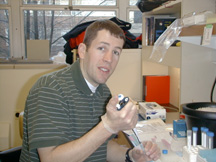
Postdoctoral Student - Current research interests: Monocytes are peripheral blood cells that can be stimulated to differentiate into macrophages. Macrophages play important roles in many immune functions including phagocytosis of pathogens, antigen presentation, and secretion of cytokines. Upon differentiation of monocytes into macrophages, there is an increase in the expression of various PDE isoforms. However, how the increased expression of some of these PDE's contribute to macrophage function has not been elucidated. One portion of my project aspires to understand the role in these cells of PDE1, a Ca+2/calmodulin regulated PDE.
For many PDE's selective inhibitors are not available, precluding their study. To facilitate research on some of these PDE's we are working on using RNAi to selectively 'knockout' a targeted PDE in cells. RNAi is a technique relying on transfection of a 21-23 nucleotide RNA duplex into cells which triggers the cell to selectively degrade a targeted mRNA, leading to a reduction in levels of the protein of interest. Once this technology is established, it can be used to determine the physiological role of different PDE's in macrophages or other cell types.

Postdoctoral Fellow - Current Research Interests: Cyclic nucleotide phosphodiesterases (PDEs) have been implicated as important players in a variety of sensory signaling pathways, the most well established of which is the visual system in mammals. The taste receptor cells in the taste buds of the tongue, which are responsible for the sensation of taste, express a number of proteins analogous to those involved in visual signal transduction. Taste receptor cells are known to express the related G-proteins transducin and gustducin, and a cyclic nucleotide gated ion channel. In addition, a PDE activity in taste tissue has been reported. It was therefore proposed that PDEs might play a central role in taste signaling, similar to the role of PDE6 in vision.
Peptides derived from the region of transducin which interacts with PDE6, as well as full length transducin, have been demonstrated to activate a PDE activity in taste tissue. In collaboration with the lab that pioneered these peptide studies, we have identified the PDE in taste tissue, and we have used an overexpression system to determine the PDEs that respond to the transducin-derived peptide. Current studies are aimed at further characterizing the activation of taste PDEs by transducin, determining the role of PDEs in taste signaling, and searching for additional signaling systems in which the regulation of a PDE by a G-protein might take place.

Res Assoc Professor - Current Research Interests; Function and structure study on the GAF domains of photoreceptor PDEs, specifically PDE6. I am also working on the use of microcalorimetry as a means of measuring binding affinities in protein-protein interactions.
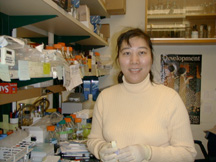
Graduate Student (MCB) - Current Research Interests: Function and structure study on the GAF domains of photoreceptor PDEs, specifically PDE6. In particular I am working to understand the structure, regulation and function of the chicken cone photoreceptor PDE6.

Graduate Student - Current Research Interests: Structure, function, and regulation of Trypanosome PDEs. In particular I am working to understand the structure, regulation and function of the TB2B isoform of trypanosome PDE.

Acting Instructor - Current Research Interests: Of the nine PDE families known to date, four have a homologous cGMP-binding domain that is immediately N-terminal to the catalytic domain. In PDE2 (cGMP-stimulated PDE), binding of cGMP to this regulatory domain relieves an inhibition on catalysis. In PDE6 (photoreceptor PDE), the role of this domain is not clear, but it is found experimentally that most of the cGMP in cone or rod cells is bound to this domain. PDE6 itself hydrolyzes cGMP, and the cGMP level determines the hyperpolarization state of the cone or rod cell. This determines if the cell triggers a nerve impulse leading to the sensation of light. In PDE5 (cGMP-specific PDE), the function of the domain is unknown. I am working on crystallization and structure determination of enzyme fragments that contain this domain. Aside from seeing the atomic structure of a common domain in PDE's, it will be of great interest to compare the cGMP binding site to that of other cyclic nucleotide binding proteins. A very recent project has been to determine the structure of the Gaf domains of Anabena adenylyl cyclase. We are nearly finished with this project.

Sr Fellow - Current Research Interests: Regulation and function of PDE10A. I am working to understand the role of PDE10 by studying the phenotype of mice having disruptions in the PDE10A gene. I am particularly interested in the role of this enzyme in male reproduction.
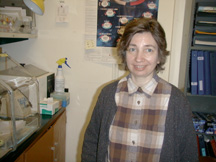
Research Technician - Current Research Interests: Structure/function relationships among different selective inhibitors of phosphodiesterases.

Res Asst Professor - Current Research Interests: cAMP and cGMP play an important role in regulating the contractility of smooth muscle cells (SMCs). Cyclic nucleotides also act as antiproliferative agents in these cells. In order to understand the regulation of smooth muscle cyclic nucleotide levels, it is important to know which PDE isoforms are present and active in SMCs. Using a combination of enzyme fractionation (HPLC), activity assays, and immunoblots, we have shown that PDE1C is present in proliferating human smooth muscle cells, but not in nonproliferating cells (Rybalkin, et. al 1997). This observation suggests that PDE1C specific inhibitors might be clinically useful as smooth muscle cell antiproliferative agents in disease states such as arthrosclerosis. More work is being performed to determine the roles of various PDE isozymes in different types of smooth muscle cells.
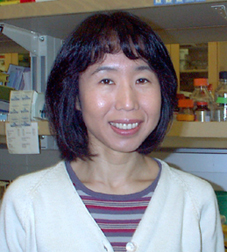
Postdoctoral Fellow - Current Research Interests: Feeding behavior is determined in part by signals generated by the body in response to food or starvation. Some of these signals come in the form of proteins or peptides which work in the brain to regulate behavior. Leptin, a "satiety factor" which is released from fat cells, is an example of such a protein. Leptin causes downregulation of neuropeptide Y (NPY) and upregulation of pro-opiomelanocortin (POMC) genes in neurons of the brain. Such changes in gene expression may contribute to leptin's anorexic effect. Several lines of evidence suggest that cyclic AMP may be involved in the regulation of feeding behavior. My work has recently shown that fasting stimulates cAMP dependent gene transcription in NPY neurons in the hypothalamus, and that leptin reduces this effect (Shimizu, et al. 2001). This suggests that cAMP may play a role in the regulation of gene expression by leptin. Work from our lab has shown that leptin's effects on cAMP levels in hepatocytes are dependent on PDE3B (Zhao, et al. 2000). Now we hope to use specific PDE inhibitors to determine which PDEs are involved in this process in neurons.
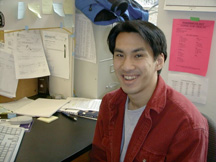
Graduate Student - Current Research Interests: I am working to characterize the phenotype of mice having disruption of the PDE11 gene.

Acting Instructor - Current Research Interests: T cells are lymphocytes that mediate the cellular immune response. Disregulation of this system can result in a number of serious diseases, including lymphoproliferative tumors and autoimmune diseases. An interesting observation is that there are numerous PDE types in T cells. While at first glance expression of so many different PDEs in one cell type seems redundant, on closer inspection it suggests that each different PDE isoform might control a specific spatio-temporal "pool" of cyclic nucleotide which has its own distinct function. In order to understand the roles of PDEs in human T cells, we would like to find a suitable animal model in which to do studies. I am determining the expression, regulation, and localization of various PDEs in mouse lymphocytes to see whether the mouse is a good model for the human system. If so, we plan to use transgenic mice and specific PDE inhibitors to identify the roles of the PDEs in T cells.